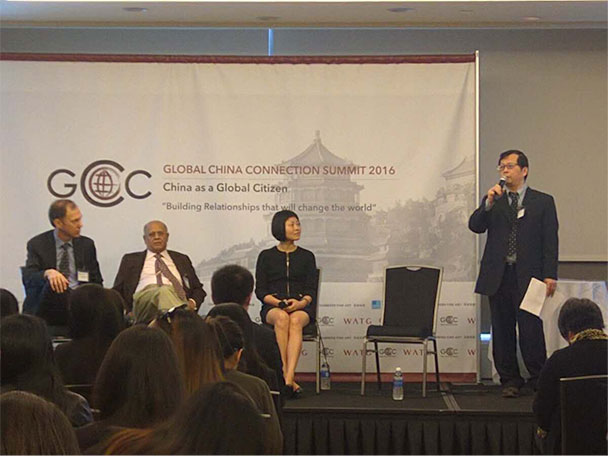CKGSB Finance Department Chair Henry Cao guided an incisive exploration of current trends in business and finance in China as panel moderator at the Global China Connection Summit 2016 at the TPK Conference Center in Midtown Manhattan.

Right to Left: CKGSB Finance Department Chair Henry Cao; Rebecca Wang, Corporate Tax Partner at PricewaterhouseCoopers; Marti Subrahmanyam, the Charles E. Merrill Professor of Finance, Economics and International Business at NYU Stern; Robert F. Whitelaw, the Edward C. Johnson 3d Professor of Entrepreneurial Finance at NYU Stern
With Professor Cao leading the way, the GCC Summit panel, March 25-26, examined China’s stock market turbulence, debt problem and cross-border real estate investment boom. The panelists were Rebecca Wang, a corporate tax partner at PricewaterhouseCoopers; Robert F. Whitelaw, the Edward C. Johnson 3d Professor of Entrepreneurial Finance at NYU Stern; and Marti Subrahmanyam, the Charles E. Merrill Professor of Finance, Economics and International Business at NYU Stern.
The keynote speaker for the conference was Chong-En Bai, the monetary policy advisor to China’s central bank and a Mansfield Freeman Chair Professor, Chairman of the Economics Department and Vice Dean of the School of Economics and Management at Tsinghua University.
Changing growth model
Professor Cao set the tone for the discussion by noting that after 30 years of rapid growth built on labor-intensive manufacturing, China now must change its growth model. “To keep growing, we need to rely on innovation in technology and more capital intensive industries,” Professor Cao said. “We need to know in which industries we need to invest. What are good firms? What is good innovation? How can new technology bring profit?
“Good financial markets” can signal the best investment direction to take, Professor Cao said.
Regulators in China are looking for lessons from the Jan. 7 suspension of new stock market rules known as circuit breakers after only four days because they were fueling sharp trading losses – rather than taming them, the professor said. The so-called circuit breakers were introduced in the wake of 2015’s wild market swings to help calm volatility. They were supposed to act as a kind of emergency brake but had the opposite effect.
The rules shut down China’s main markets twice in one week, on Monday and again on Thursday, after shares plunged by 7 percent on both days.
“The Chinese government tried to learn from the US,” Professor Cao said. “They copied exactly the US circuit breaker rule, and it backfired. In China, the circuit breaker happened twice in four days. In the US, it happened once in 10 years. The US has lots of experience. What can the Chinese learn?”
Bloomberg comments
Professor Cao, who also is a Professor of Finance and Academic Director of the school’s Finance MBA program, was quoted in a March 10 Bloomberg article on the return to China of many Chinese bankers who are frustrated in their US efforts to study business, find work and earn salaries beyond reach at home. One reason for the repatriation of some of China’s brightest young business minds is that with the government encouraging entrepreneurship to drive growth, China’s financial markets are now seen as competitive.
The GCC conference, featuring panels with notable professionals in finance, technology, academia and art, aimed to build meaningful relationships between leaders, entrepreneurs and university students for future endeavors. Attendees could engage in discussions with professionals on diverse topics, participate in a Career Fair hosted by prominent companies, attend up and coming startups’ showcases, and learn how to better understand the Chinese culture.